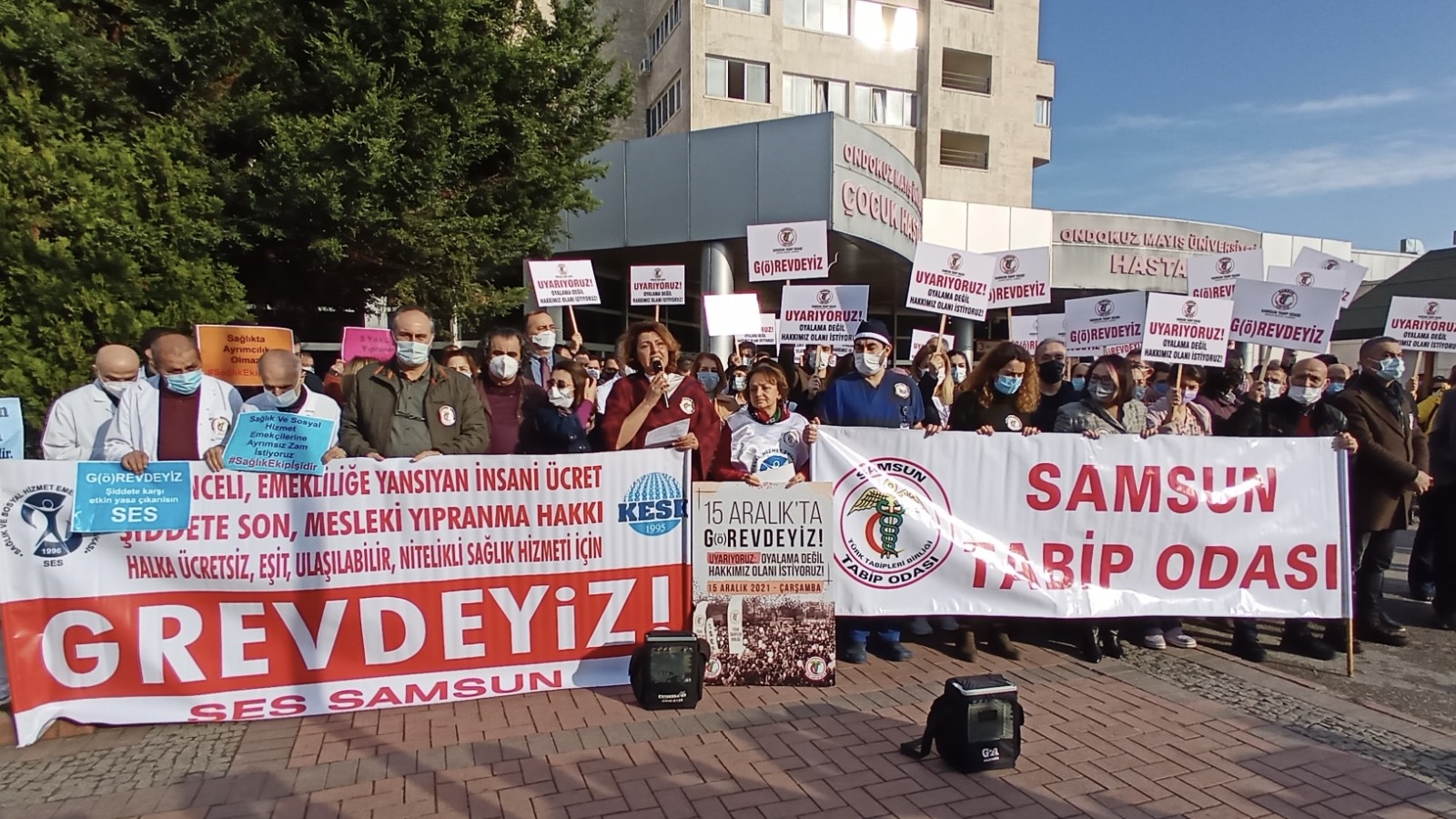Health workers went on strike on December 15 in Turkey to fight the neglect from the country’s Ministry of Health. Physicians, nurses, and other health workers joined forces after the Health Minister Fahrettin Koca announced the withdrawal of a pay hike scheme offered earlier that month to one part of the physicians – a move that irritated those who were supposed to get a much needed increase in pay, as well as those neglected in the original plan.
Before the strike, health workers, particularly physicians, held a series of actions over the course of two months – including a protest march from the northwest province of Kocaeli, through the towns of Bursa and Eskişehir, to Ankara, the capital. The march, referred to as “the White March” by the organizers because of the lab coats worn by doctors, led to the drafting of an action plan and list of requests by the workers’ organizations, including the Turkish Medical Association (TMA) and the medical chambers of several provinces. Among the requests, the improvement of working conditions figures as one of the key issues shared by all health professions.
Below poverty and hunger lines
Workers across the sector say working conditions within the healthcare system have been difficult for a long time, as they face systemic issues of long working hours, inadequate salaries, and violence from patients. Dr. Sebnem Korur Fincanci, President of the TMA, explains that the root of this unfortunate violence that many face in health institutions is over patients frustration with the system and how inaccessible this is. This frustration he explains is unfortunately misdirected at health workers’.
In terms of salaries, health workers have reported them being too low for achieving an adequate standard of living. In the case of physicians in public institutions, their salaries are made of a base element and a performance-based addition. Since the base salary is not enough to cover all living expenses, most physicians rely on the performance-based additions to make ends meet. However, the addition is paid on the basis of the quantity of care procedures administered, rather than the quality of the care provided. Since the beginning of the COVID-19 pandemic, care delivery has been complicated, and most physicians were left without the extra income represented by the performance payment.
Low salaries are a serious problem among other professions too, and most health workers found themselves below the national poverty line even before the financial crisis faced by the country today. Among some of the technical staff, for example cleaners, and a part of the nurses, the salaries are now so low that they are below the hunger line.
Most of those who can, choose to emigrate. According to TMA data, 1,405 physicians left the country in 2021; and this number only refers to those who requested a formal leaving certificate – the actual number could be higher. Those who stay are forced to take as many additional paid tasks as they can, resulting in widespread burnout and other health issues. For example, physicians are paid extra for taking on night shifts, of which they can formally do a maximum of 130 hours over the course of one month. Although rest after prolonged night shifts is key for safeguarding the health of the workers, many of the younger doctors forgo it to avoid a reduction in income. This practice has already led to unfortunate events, like a recent death of a gynecology resident in Ankara, who fell asleep while driving after a 36-hour shift at the city’s public hospital.
Uncertainty haunts health workers
It is not only income-related uncertainty in a time of inflation that troubles certain groups of physicians, but job security too. Following the changes introduced during the Health Transformation Program from 2003 to 2013, the whole field of family medicine now operates on a contract basis. This is significantly different from the period before the reform, when family doctors were public employees and could count on better protection. Instead, the current system leaves it to an outside commission to decide on who is awarded the contract for providing care in a certain place – or not.
Even without a well-grounded reason, such as confirmed malpractice, the commission was known to deny the renewal of contracts for certain doctors, jeopardizing the health of their patients as well as the physicians’ livelihoods. “Doctors’ jobs are getting less and less secure”, says Dr. Financi.
As other health workers don’t find themselves in a much better position job- and income-wise, the minister’s announcement of a selective pay hike made at the beginning of December galvanized the part of the health workers that were excluded from the plans.
Dr. Fincanci explains that many reacted to the unfairness of the proposal, which did not even consider health workers apart from physicians. Even among doctors, there were those who were left out, including family physicians. But, while other health workers began to strike before mid-December, albeit with very low attendance, physicians joined the actions after the health minister decided to withdraw the proposal that was on the table.
With a renewed strike call, the TMA, backed by the Health and Social Services Workers’ Trade Union (SES) and other trade unions, managed to kick-jump the largest strike of health workers in years weeks ahead of an expected new parliamentary discussion on health workers’ rights. It is yet to be seen if any improvement will come out of the debate, but health workers remain determined to keep the pressure on by continuing their actions.
Read more articles from the latest edition of the People’s Health Dispatch and subscribe to the newsletter here.





